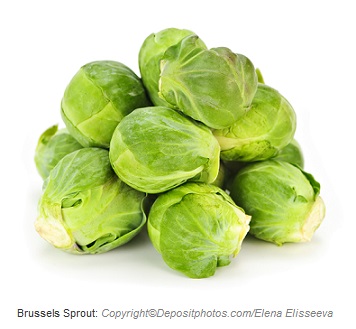Brussels sprout is a green leafy vegetable from cabbage (brassica) family. One cup of Brussels  sprout contains 12 grams of carbohydrates, 6 grams of fiber and 4 grams of protein.
sprout contains 12 grams of carbohydrates, 6 grams of fiber and 4 grams of protein.
Average calories: 64 per one cup.
|
Brussels Sprout: one cup |
|
|
Carbohydrate |
12 |
|
Fiber |
6 |
|
Protein |
4 |
|
Fat |
0 |
|
Calories |
64 |
Vitamins found in higher amounts: vitamins K, C, A, B9, B6, B2 and B1.
Minerals found in higher amounts: manganese, potassium, iron, and phosphorus.
Phytonutrients found in higher amounts and their health benefits: the phytonutrients in Brussels sprout are the same as those in broccoli, and they include indole-3-carbinol, diindolylmethane, sulforaphane, isothiocyanates, carotenoids, and flavonoids.
Indole-3-carbinol is a phytonutrient that can reduce risk of developing estrogen-related cancers by altering the metabolism of estrogen. Indole-3-carbinole is also found in cabbage, cauliflower, broccoli, kale and collard greens.
Diindolylmethane (DIM) comes from the breakdown of indole-3-carbinol in the body and has anti-viral, anti-bacterial, anti-androgenic, anti-inflammatory, and anti-cancer properties. Showing angiogenesis-preventing effect, DIM shows activity against HPV (human papilloma virus) as well.
Sulforaphane can inhibit the growth of Helicobacter Pylori, a microbe responsible for peptic ulcer and stomach upset. Sulforaphane is also found in Bok Choy, broccoli, cabbage, cauliflower, kale, collards, kohlrabi, mustard, turnip, radish, arugula, and watercress.
Isothiocyanates induce apoptosis (programmed cell death) in certain cancers. However, the downside of isothiocyanides is that they interfere with uptake of iodine, leading to goiter (enlargement of thyroid gland).
Isothiocyanates can enhance liver detoxification by stimulating both phase I and phase II of detoxifying enzymes.
Sinigrin is a glucosinolate in Brussels sprout and demonstrates activity against colon cancer.
Beta-carotene, lutein and zeaxanthin are the carotenoids found in significant amounts in Brussels sprout. They are antioxidants with a protective effect on the eyes.
Quercetin and kaempferol are the most notable flavonoids in Brussels sprout. They have anti-inflammatory, cancer-preventing, anti-oxidative, and immune system-enhancing properties.
Brussels sprout contains Omega-3 (alpha-linolenic acid; ALA), Omega-6 (linoleic acid;LA), and Omega-9 (erucic acid) fatty acids.

